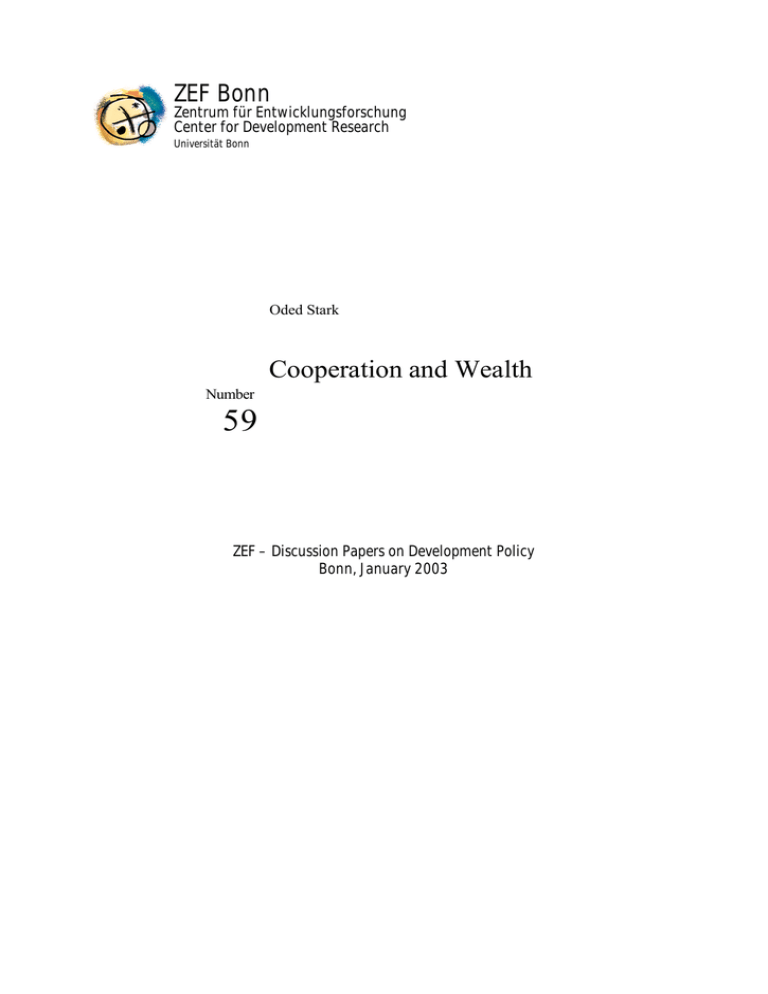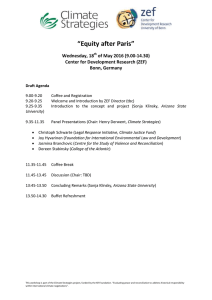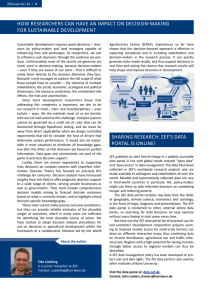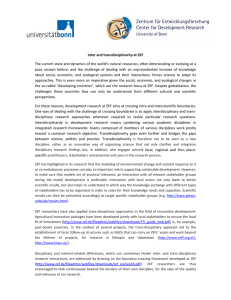59 Cooperation and Wealth ZEF Bonn
advertisement

ZEF Bonn Zentrum für Entwicklungsforschung Center for Development Research Universität Bonn Oded Stark Cooperation and Wealth Number 59 ZEF – Discussion Papers on Development Policy Bonn, January 2003 The CENTER FOR DEVELOPMENT RESEARCH (ZEF) was established in 1995 as an international, interdisciplinary research institute at the University of Bonn. Research and teaching at ZEF aims to contribute to resolving political, economic and ecological development problems. ZEF closely cooperates with national and international partners in research and development organizations. For information, see: http://www.zef.de. ZEF – DISCUSSION PAPERS ON DEVELOPMENT POLICY are intended to stimulate discussion among researchers, practitioners and policy makers on current and emerging development issues. Each paper has been exposed to an internal discussion within the Center for Development Research (ZEF) and an external review. The papers mostly reflect work in progress. Oded Stark: Cooperation and Wealth, ZEF – Discussion Papers On Development Policy No. 59, Center for Development Research, Bonn, January 2003, pp. 13. ISSN: 1436-9931 Published by: Zentrum für Entwicklungsforschung (ZEF) Center for Development Research Walter-Flex-Strasse 3 D – 53113 Bonn Germany Phone: +49-228-73-1861 Fax: +49-228-73-1869 E-Mail: zef@uni-bonn.de http://www.zef.de The author: Oded Stark, Center for Development Research, University of Bonn Cooperation and Wealth Contents Acknowledgements Abstract 1 Kurzfassung 1 1 Introduction 2 2 The Game and the Payoffs 3 3 The Types and their Expected Payoffs 4 4 Equilibrium with Defectors and Testing Cooperators but without Non-Testing Cooperators 5 The Relationship between the Equilibrium Fraction of Cooperators in a Population and a Population’s Level of Wealth 6 7 6 8 Robustness of the Cooperation-Wealth Relationship when the Testing Cooperators are Somewhat Adventurous 10 Conclusion 12 References 13 ZEF Discussion Papers on Development Policy 59 Acknowledgements I am indebted to Theodore C. Bergstrom for stimulating correspondence and to Paul S.H. Lau for enlightening comments. Partial financial support from the Humboldt Foundation is gratefully acknowledged. Cooperation and Wealth Abstract We calculate the equilibrium fraction of cooperators in a population in which payoffs accrue from playing a single-shot prisoner’s dilemma game. Individuals who are hardwired as cooperators or defectors are randomly matched into pairs, and cooperators are able to perfectly find out the type of a partner to a game by incurring a recognition cost. We show that the equilibrium fraction of cooperators relates negatively to the population’s level of wealth. Kurzfassung Wir berechnen den Gleichgewichtsanteil von Kooperierenden in einer Population, in der Vorteile beim Spielen eines einstufigen Gefangenendilemma-Spieles entstehen. Individuen, die als Kooperierende oder Nicht-Kooperierende eingestuft werden, werde zufallsmäßig zu Paaren zusammengefasst. Kooperierende sind in der Lage den Partnertyp zu identifizieren, indem sie Erkenntniskosten akzeptieren. Wir zeigen, dass der Gleichgewichtsanteil von Kooperierenden negativ in Beziehung zum Wohlstandsniveau der Population steht. 1 ZEF Discussion Papers on Development Policy 59 1 Introduction An example illustrates that the level of wealth of a population and the equilibrium fraction of cooperators in a population are inversely related. It has been argued that the fraction of cooperators in a large society can be expected to be smaller than the fraction of cooperators in a small society (Binmore, 1998; Cook and Hardin, 2001). To the extent that a large society (say a city) is wealthier than a small society (say a town), the size effect may conceal a wealth effect. 2 Cooperation and Wealth 2 The Game and the Payoffs Consider the following two-player, two-strategy game in which a player who cooperates gets a payoff of R if his opponent cooperates, and S if the opponent defects. A player who defects gets T if his opponent cooperates, and P if the opponent defects. The game is a prisoner’s dilemma game: T > R > P > S . Hence defection is the dominant strategy for each player. Let there be a large population of players consisting of individuals who are hardwired to be cooperators and individuals who are hardwired to be defectors. Individuals are randomly matched into pairs. An individual does not know the type of the individual with whom he is matched, but he can obtain such information at a cost, 0 < K < K , where K will be defined below. The type-recognition test is perfect. Thus, if an individual chooses to incur the cost and administer the test, the individual finds out whether he is matched with a cooperator or with a defector. The individual can then decide to play or not to play. If the individual decides not to play, he randomly picks another individual from the population and administers the typerecognition test in the new match. If individuals agree to play, they play their hardwired strategies, receive their respective payoffs, and leave the partner-seeking population to be replaced by new individuals. In equilibrium (to be characterized below) the flow of individuals of each type who enter the population exactly replaces the flow of individuals of each type who exit the population. 3 ZEF Discussion Papers on Development Policy 59 3 The Types and their Expected Payoffs Following Stark (1999, chapter 5), we study a population that consists of three types: defectors who play without incurring a recognition cost, cooperators who play after incurring the recognition cost, and cooperators who play without incurring the recognition cost. While there can be an equilibrium with all three types present and an equilibrium with defectors only, i. there cannot be an equilibrium without defectors; and ii. there cannot be an equilibrium with only defectors and non-testing cooperators. The rationale for i. is that there cannot be an equilibrium with only non-testing cooperators because defectors will do better than cooperators; there cannot be an equilibrium with only testing cooperators because non-testing cooperators will do better; and there cannot be an equilibrium with only both types of cooperators because the non-testing cooperators will do better than the testing cooperators. The rationale for ii. is that there cannot be an equilibrium with only defectors and non-testing cooperators because defectors will do better than the non-testing cooperators. Let the steady-state fractions of testing cooperators, non-testing cooperators, and defectors be πt , π nt , and πd , respectively, πt + πnt + πd = 1. Given the manner in which a testing cooperator acts and plays, his expected payoff is Vt = R − K . 1− πd (1) The proof is as follows: The expected net payoff from administering the cost K (exactly once) and encountering a cooperator in the first match is R(1 − πd ) − K (1 − π d ); from failing to encounter a cooperator in the first match but encountering one in the second match is Rπd (1 − πd ) − 2 Kπd (1 − πd ); from failing to encounter a cooperator in the first two matches but succeeding in encountering one in the third match is Rπd2 (1 − π d ) − 3Kπd2 (1 − π d ); and so on. Thus, Vt = R(1 − π d ) − K (1 − πd ) + Rπd (1 − πd ) − 2Kπ d (1 − πd ) + Rπ d2 (1 − π d ) − 3Kπd2 (1 − π d ) + Λ R(1 − πd ) = − K (1 − π d )(1 + 2πd + 3π d2 + Λ ) 1 −πd = R − K (1 − πd )[(1 + π d + πd2 + Λ ) + (πd + πd2 + Λ ) + (πd2 + Λ ) + Λ ] πd πd2 1 = R − K (1 − πd )( + + +Λ ) 1 − πd 1 − π d 1 − π d 4 Cooperation and Wealth 1 1−π d K .□ = R − K (1 − π d ) = R− 1−π d 1−π d The expected payoff of a non-testing cooperator who plays the game with whoever he is paired with in the first match is Vnt = (1 − π d ) R + π d S . (2) Since a defector always plays, that is, he plays when matched either with a non-testing cooperator or with a defector, his expected payoff is Vd = 1−πt −π d π π T + d P = T − d (T − P). 1−πt 1−πt 1−πt (3) 5 ZEF Discussion Papers on Development Policy 59 4 Equilibrium with Defectors and Testing Cooperators but without Non-Testing Cooperators From the discussion in the preceding section it follows that an equilibrium with defectors and testing cooperators but without non-testing cooperators is feasible. If there are no non-testing K cooperators, πt + πd = 1; the expected payoff of testing cooperators is Vt = R − ; and the πt expected payoff of defectors (who can play only with defectors) is Vd = P. In equilibrium, testing cooperators receive the same expected payoff as defectors. Thus, R − πt = K , R −P K = P or πt (4) assuming that K < R − P ≡ K . To help unravel the nature of the equilibrium, consider alternative values of K. Suppose that K were equal to R − P . πt would then be equal to one. But having a population with only testing cooperators cannot be an equilibrium because in that case the non-testing cooperators will do better. Thus, we have a contradiction. Suppose that K → 0. It follows that πt → 0 . Yet suppose the opposite, that is, that πt → 1. If such were the case, the population would consist of only testing cooperators which, from i. in section 3, cannot hold. As K assumes values that increasingly move it away from being close to R − P toward close to zero, the associated values of πt must become smaller. To see the reason for this result, suppose that an equilibrium holds at R − K0 = P and consider the opposite, that is, as K declines from K 0 to K1 , πt increases πt 0 from πt 0 R− to πt1 . But then K1 K0 < , rendering it impossible to restore equilibrium at πt 1 πt 0 K0 = P. As long as R and P are given, observing the equilibrium requires that πt and K πt 0 move in tandem. To complete the characterization of the equilibrium we note that in order for there to be no non-testing cooperators in the population, it has to be the case that if a non-testing cooperator were to enter the population, he will receive a lower payoff than that received by the testing 6 Cooperation and Wealth cooperators and the defectors, that is, πt R + (1 − πt ) S < P. Substituting πt = K R−P and ( P − S )( R − P) P − S = K < K since P − S < R − S . Hence, R− S R −S P−S exclusion of non-testing cooperators requires that K < K ≡ K. R−S rearranging terms we get K < 7 ZEF Discussion Papers on Development Policy 59 5 The Relationship between the Equilibrium Fraction of Cooperators in a Population and a Population’s Level of Wealth Suppose we compare two populations that are equal in all respects except that one population is uniformly wealthier than the other population. By “uniformly” we mean that there are no distributional differences in the payoffs to strategies; the only difference between the two populations is that in one population the payoffs are uniformly higher than in the other K population, say by a factor of µ > 1. Holding K constant, πtw = of the wealthier µ( R − P ) K of the less wealthy population: the equilibrium fraction of R−P cooperators in a wealthy population is smaller than the equilibrium fraction of cooperators in a (uniformly) less wealthy population.1 population is smaller than πt = To appreciate the nature of this outcome consider the case of πt = µ → ∞. It follows that πt → 0. K where µ( R − P) The implication of a rising µ is that the absolute difference between the payoffs R and P becomes increasingly larger. With K held constant, if πt were, alternatively, to rise, the expected payoff of testing cooperators will increasingly distance itself from the expected payoff of defectors (who, it will be recalled, play only with defectors) and equilibrium will not be restored. Two comments regarding recognition costs are in order. First, for the equilibrium to hold, K can take a wider range of values than before since the constraint pertaining to K, which is now K < µK , is less stringent. Second, the inverse relationship between the equilibrium fraction of cooperators and the level of wealth holds even when K increases with wealth, provided that the increase is less than µ. An increase in wealth is due to and entails a first order increase in the payoffs from trade and exchange but, at most, a second order increase in the cost of conducting 1 To rule out the possibility that, in spite of the payoffs to every cooperator and to every defector being higher in the wealthier population, the payoff per capita (and, since population size is held constant, total wealth) will be lower in the wealthier population, the sufficient condition that µ> µ ≡ πt can be added. (This condition arises from the πtw requirement that the per capita payoff in the wealthier population will be higher than the per capita payoff in the less wealthy population: 8 πtw ( µR − K K ) + (1 − πtw ) µP > πt ( R − ) + (1 − πt ) P.) w πt πt Cooperation and Wealth trade. Indeed, in a population whose level of wealth is higher, the recognition cost could be lower (for example, a computerized credit inquiry could replace a lengthy interview). If K ( µ) K = K (µ) and K ′( µ) < 0, then πtw = and µ( R − P ) ∂πtw K ( µ) K ′( µ) K ( µ) =− 2 + <− 2 ; ∂µ µ ( R − P) µ( R − P) µ ( R − P) the adverse effect of a higher level of wealth on the equilibrium fraction of cooperators is stronger. 9 ZEF Discussion Papers on Development Policy 59 6 Robustness of the Cooperation-Wealth Relationship when the Testing Cooperators are Somewhat Adventurous Suppose that a testing cooperator acts in the following manner: with probability 0 < q ≤ 1 he administers the type-recognition test. With probability 1 − q he does not resort to the test and plays with whoever he happens to be paired with. (We know that q cannot be equal to zero because then we will have only defectors and non-testing cooperators which, from ii. in section 3, cannot be the case in equilibrium.) We seek to find out whether the result of section 5 holds in this setting too. The expected payoff of an adventurous testing cooperator is Vt a = (1 − π d ) R + (1 − q)π d S − qK . 1 − qπ d (5) The proof is as follows: when testing occurs with probability q, a match will confer a payoff either when the test is applied (at a cost K) and the partner in the match is found to be a cooperator, a case in which the play yields q[− K + (1 − π d ) R], or when the test is not applied, a case in which the payoff received is (1 − q )[(1 − π d ) R + π d S ]. In the event that the test is applied and the partner to the match is found not to be a cooperator, which occurs with probability qπ d , no payoff is received and the entire procedure is repeated thereby yielding Vt a . Thus, Vt a = q[− K + (1 − π d ) R] + (1 − q )[(1 − π d ) R + π d S ] + qπ d Vt a = the Vd = (1 − π d ) R + (1 − q )π d S − qK .□ 1 − qπ d Since the combined population share of testing cooperators who happen not to administer test and of defectors is 1 − qπ t , the expected payoff of a defector is πd 1 − qπ t − π d T+ P or 1 − qπ t 1 − qπ t Vd = T − 10 πd (T − P). 1 − qπ t (6) Cooperation and Wealth In equilibrium, adventurous cooperators receive the same expected payoff as defectors. Thus, from (5) and (6), (1 − πd ) R + (1 − q )π d S − qK πd =T − (T − P ). 1 − qπd 1 − qπt Of course, qπt + (1 − q )πt = πt and hence πt + πd = 1. We therefore have that πt R + (1 − q)(1 − πt ) S − qK 1 − πt =T − (T − P). 1 − q (1 − πt ) 1 − qπt Evaluating this last equality at q = 1 yields (7) πt R − K = T − (T − P) or πt πt = K . R−P By continuity this last equality holds for values of q in (7) that are in the small neighborhood of 1. Hence, the cooperation-wealth relationship alluded to in section 5 holds also when testing cooperators apply the test with a probability that is less than, but close to, one. 11 ZEF Discussion Papers on Development Policy 59 7 Conclusion We calculate the equilibrium fraction of cooperators in a population in which payoffs are received upon playing a two-person single-shot prisoner’s dilemma game; individuals who are hardwired as cooperators or as defectors are paired randomly; cooperators check, at a cost, the type of individual with whom they are paired prior to executing a game, and play only with cooperators; and defectors play with whomever they happen to be paired with. Measuring the wealth of a population by the level of the payoffs in the prisoner’s dilemma game, we show that the wealthier the population the lower the equilibrium fraction of cooperators. 12 Cooperation and Wealth References Binmore, Ken. 1998. Game Theory and the Social Contract II: Just Playing. Cambridge, MA: MIT Press. Cook, Karen S. and Hardin, Russell. 2001. “Norms of Cooperativeness and Networks of Trust,” in: Hechter, Michael and Opp, Karl-Dieter (eds.) Social Norms. New York: Russell Sage Foundation, pp. 327-347. Stark, Oded. 1999. Altruism and Beyond: An Economic Analysis of Transfers and Exchanges Within Families and Groups. Cambridge: Cambridge University Press. 13 ZEF Discussion Papers on Development Policy The following papers have been published so far: No. 1 No. 2 No. 3 Ulrike Grote, Arnab Basu, Diana Weinhold Child Labor and the International Policy Debate Patrick Webb, Maria Iskandarani Water Insecurity and the Poor: Issues and Research Needs Matin Qaim, Joachim von Braun Crop Biotechnology in Developing Countries: A Conceptual Framework for Ex Ante Economic Analyses Zentrum für Entwicklungsforschung (ZEF), Bonn, September 1998, pp. 47. Zentrum für Entwicklungsforschung (ZEF), Bonn, Oktober 1998, pp. 66. Zentrum für Entwicklungsforschung (ZEF), Bonn, November 1998, pp. 24. No. 4 Sabine Seibel, Romeo Bertolini, Dietrich Müller-Falcke Informations- und Kommunikationstechnologien in Entwicklungsländern No. 5 Jean-Jacques Dethier Governance and Economic Performance: A Survey No. 6 Mingzhi Sheng Lebensmittelhandel und Kosumtrends in China Zentrum für Entwicklungsforschung (ZEF), Bonn, January 1999, pp. 50. Zentrum für Entwicklungsforschung (ZEF), Bonn, April 1999, pp. 62. Zentrum für Entwicklungsforschung (ZEF), Bonn, May 1999, pp. 57. No. 7 Arjun Bedi The Role of Information and Communication Technologies in Economic Development – A Partial Survey Zentrum für Entwicklungsforschung (ZEF), Bonn, May 1999, pp. 42. No. 8 No. 9 Abdul Bayes, Joachim von Braun, Rasheda Akhter Village Pay Phones and Poverty Reduction: Insights from a Grameen Bank Initiative in Bangladesh Johannes Jütting Strengthening Social Security Systems in Rural Areas of Developing Countries Zentrum für Entwicklungsforschung (ZEF), Bonn, June 1999, pp. 47. Zentrum für Entwicklungsforschung (ZEF), Bonn, June 1999, pp. 44. No. 10 Mamdouh Nasr Assessing Desertification and Water Harvesting in the Middle East and North Africa: Policy Implications Zentrum für Entwicklungsforschung (ZEF), Bonn, July 1999, pp. 59. No. 11 Oded Stark, Yong Wang Externalities, Human Capital Formation and Corrective Migration Policy Zentrum für Entwicklungsforschung (ZEF), Bonn, August 1999, pp. 17. ZEF Discussion Papers on Development Policy No. 12 John Msuya Nutrition Improvement Projects in Tanzania: Appropriate Choice of Institutions Matters Zentrum für Entwicklungsforschung (ZEF), Bonn, August 1999, pp. 36. No. 13 Liu Junhai Legal Reforms in China Zentrum für Entwicklungsforschung (ZEF), Bonn, August 1999, pp. 90. No. 14 Lukas Menkhoff Bad Banking in Thailand? An Empirical Analysis of Macro Indicators Zentrum für Entwicklungsforschung (ZEF), Bonn, August 1999, pp. 38. No. 15 Kaushalesh Lal Information Technology and Exports: A Case Study of Indian Garments Manufacturing Enterprises Zentrum für Entwicklungsforschung (ZEF), Bonn, August 1999, pp. 24. No. 16 Detlef Virchow Spending on Conservation of Plant Genetic Resources for Food and Agriculture: How much and how efficient? Zentrum für Entwicklungsforschung (ZEF), Bonn, September 1999, pp. 37. No. 17 Arnulf Heuermann Die Bedeutung von Telekommunikationsdiensten für wirtschaftliches Wachstum Zentrum für Entwicklungsforschung (ZEF), Bonn, September 1999, pp. 33. No. 18 No. 19 Ulrike Grote, Arnab Basu, Nancy Chau The International Debate and Economic Consequences of Eco-Labeling Manfred Zeller Towards Enhancing the Role of Microfinance for Safety Nets of the Poor Zentrum für Entwicklungsforschung (ZEF), Bonn, September 1999, pp. 37. Zentrum für Entwicklungsforschung (ZEF), Bonn, October 1999, pp. 30. No. 20 No. 21 No. 22 Ajay Mahal, Vivek Srivastava, Deepak Sanan Decentralization and Public Sector Delivery of Health and Education Services: The Indian Experience M. Andreini, N. van de Giesen, A. van Edig, M. Fosu, W. Andah Volta Basin Water Balance Susanna Wolf, Dominik Spoden Allocation of EU Aid towards ACP-Countries Zentrum für Entwicklungsforschung (ZEF), Bonn, January 2000, pp. 77. Zentrum für Entwicklungsforschung (ZEF), Bonn, March 2000, pp. 29. Zentrum für Entwicklungsforschung (ZEF), Bonn, March 2000, pp. 59. ZEF Discussion Papers on Development Policy No. 23 Uta Schultze Insights from Physics into Development Processes: Are Fat Tails Interesting for Development Research? Zentrum für Entwicklungsforschung (ZEF), Bonn, March 2000, pp. 21. No. 24 No. 25 No. 26 No. 27 Joachim von Braun, Ulrike Grote, Johannes Jütting Zukunft der Entwicklungszusammenarbeit Oded Stark, You Qiang Wang A Theory of Migration as a Response to Relative Deprivation Doris Wiesmann, Joachim von Braun, Torsten Feldbrügge An International Nutrition Index – Successes and Failures in Addressing Hunger and Malnutrition Maximo Torero The Access and Welfare Impacts of Telecommunications Technology in Peru Zentrum für Entwicklungsforschung (ZEF), Bonn, March 2000, pp. 25. Zentrum für Entwicklungsforschung (ZEF), Bonn, March 2000, pp. 16. Zentrum für Entwicklungsforschung (ZEF), Bonn, April 2000, pp. 56. Zentrum für Entwicklungsforschung (ZEF), Bonn, June 2000, pp. 30. No. 28 Thomas HartmannWendels Lukas Menkhoff Could Tighter Prudential Regulation Have Saved Thailand’s Banks? No. 29 Mahendra Dev Economic Liberalisation and Employment in South Asia No. 30 Noha El-Mikawy, Amr Hashem, Maye Kassem, Ali El-Sawi, Abdel Hafez El-Sawy, Mohamed Showman Institutional Reform of Economic Legislation in Egypt No. 31 Kakoli Roy, Susanne Ziemek On the Economics of Volunteering No. 32 Assefa Admassie The Incidence of Child Labour in Africa with Empirical Evidence from Rural Ethiopia Zentrum für Entwicklungsforschung (ZEF), Bonn, July 2000, pp. 40. Zentrum für Entwicklungsforschung (ZEF), Bonn, August 2000, pp. 82. Zentrum für Entwicklungsforschung (ZEF), Bonn, August 2000, pp. 72. Zentrum für Entwicklungsforschung (ZEF), Bonn, August 2000, pp. 47. Zentrum für Entwicklungsforschung (ZEF), Bonn, October 2000, pp. 61. No. 33 Jagdish C. Katyal, Paul L.G. Vlek Desertification - Concept, Causes and Amelioration Zentrum für Entwicklungsforschung (ZEF), Bonn, October 2000, pp. 65. ZEF Discussion Papers on Development Policy No. 34 Oded Stark On a Variation in the Economic Performance of Migrants by their Home Country’s Wage Zentrum für Entwicklungsforschung (ZEF), Bonn, October 2000, pp. 10. No. 35 Ramón Lopéz Growth, Poverty and Asset Allocation: The Role of the State Zentrum für Entwicklungsforschung (ZEF), Bonn, March 2001, pp. 35. No. 36 Kazuki Taketoshi Environmental Pollution and Policies in China’s Township and Village Industrial Enterprises Zentrum für Entwicklungsforschung (ZEF), Bonn, March 2001, pp. 37. No. 37 Noel Gaston, Douglas Nelson Multinational Location Decisions and the Impact on Labour Markets Zentrum für Entwicklungsforschung (ZEF), Bonn, May 2001, pp. 26. No. 38 Claudia Ringler Optimal Water Allocation in the Mekong River Basin Zentrum für Entwicklungsforschung (ZEF), Bonn, May 2001, pp. 50. No. 39 Ulrike Grote, Stefanie Kirchhoff Environmental and Food Safety Standards in the Context of Trade Liberalization: Issues and Options Zentrum für Entwicklungsforschung (ZEF), Bonn, June 2001, pp. 43. No. 40 No. 41 No. 42 Renate Schubert, Simon Dietz Environmental Kuznets Curve, Biodiversity and Sustainability Stefanie Kirchhoff, Ana Maria Ibañez Displacement due to Violence in Colombia: Determinants and Consequences at the Household Level Francis Matambalya, Susanna Wolf The Role of ICT for the Performance of SMEs in East Africa – Empirical Evidence from Kenya and Tanzania Zentrum für Entwicklungsforschung (ZEF), Bonn, October 2001, pp. 30. Zentrum für Entwicklungsforschung (ZEF), Bonn, October 2001, pp. 45. Zentrum für Entwicklungsforschung (ZEF), Bonn, December 2001, pp. 30. No. 43 Oded Stark, Ita Falk Dynasties and Destiny: On the Roles of Altruism and Impatience in the Evolution of Consumption and Bequests Zentrum für Entwicklungsforschung (ZEF), Bonn, December 2001, pp. 20. No. 44 Assefa Admassie Allocation of Children’s Time Endowment between Schooling and Work in Rural Ethiopia Zentrum für Entwicklungsforschung (ZEF), Bonn, February 2002, pp. 75. ZEF Discussion Papers on Development Policy No. 45 Andreas Wimmer, Conrad Schetter Staatsbildung zuerst. Empfehlungen zum Wiederaufbau und zur Befriedung Afghanistans. (German Version) State-Formation First. Recommendations for Reconstruction and Peace-Making in Afghanistan. (English Version) Zentrum für Entwicklungsforschung (ZEF), Bonn, April 2002, pp. 27. No. 46 Torsten Feldbrügge, Joachim von Braun Is the World Becoming A More Risky Place? - Trends in Disasters and Vulnerability to Them – Zentrum für Entwicklungsforschung (ZEF), Bonn, May 2002, pp. 42 No. 47 Joachim von Braun, Peter Wobst, Ulrike Grote “Development Box” and Special and Differential Treatment for Food Security of Developing Countries: Potentials, Limitations and Implementation Issues Zentrum für Entwicklungsforschung (ZEF), Bonn, May 2002, pp. 28 No. 48 Shyamal Chowdhury Attaining Universal Access: Public-Private Partnership and Business-NGO Partnership Zentrum für Entwicklungsforschung (ZEF), Bonn, June 2002, pp. 37 No. 49 L. Adele Jinadu Ethnic Conflict & Federalism in Nigeria Zentrum für Entwicklungsforschung (ZEF), Bonn, September 2002, pp. 45 No. 50 Oded Stark, Yong Wang Overlapping No. 51 Roukayatou Zimmermann, Matin Qaim Projecting the Benefits of Golden Rice in the Philippines No. 52 Gautam Hazarika, Arjun S. Bedi Schooling Costs and Child Labour in Rural Pakistan No. 53 Margit Bussmann, Indra de Soysa, John R. Oneal The Effect of Foreign Investment on Economic Development and Income Inequality Maximo Torero, Shyamal K. Chowdhury, Virgilio Galdo Willingness to Pay for the Rural Telephone Service in Bangladesh and Peru Hans-Dieter Evers, Thomas Menkhoff Selling Expert Knowledge: The Role of Consultants in Singapore´s New Economy No. 54 No. 55 Zentrum für Entwicklungsforschung (ZEF), Bonn, August 2002, pp. 17 Zentrum für Entwicklungsforschung (ZEF), Bonn, September 2002, pp. 33 Zentrum für Entwicklungsforschung (ZEF), Bonn October 2002, pp. 34 Zentrum für Entwicklungsforschung (ZEF), Bonn, October 2002, pp. 35 Zentrum für Entwicklungsforschung (ZEF), Bonn, October 2002, pp. 39 Zentrum für Entwicklungsforschung (ZEF), Bonn, October 2002, pp. 29 ZEF Discussion Papers on Development Policy No. 56 Qiuxia Zhu Stefanie Elbern Economic Institutional Evolution and Further Needs for Adjustments: Township Village Enterprises in China Zentrum für Entwicklungsforschung (ZEF), Bonn, November 2002, pp. 41 No. 57 Ana Devic Prospects of Multicultural Regionalism As a Democratic Barrier Against Ethnonationalism: The Case of Vojvodina, Serbia´s “Multiethnic Haven” Zentrum für Entwicklungsforschung (ZEF), Bonn, December 2002, pp. 29 No. 58 Heidi Wittmer Thomas Berger Clean Development Mechanism: Neue Potenziale für regenerative Energien? Möglichkeiten und Grenzen einer verstärkten Nutzung von Bioenergieträgern in Entwicklungsländern Zentrum für Entwicklungsforschung (ZEF), Bonn, December 2002, pp. 81 No. 59 Oded Stark Cooperation and Wealth Zentrum für Entwicklungsforschung (ZEF), Bonn, January 2003, pp. 13 ISSN: 1436-9931 The papers can be ordered free of charge from: Zentrum für Entwicklungsforschung (ZEF) Center for Development Research Walter-Flex-Str. 3 D – 53113 Bonn, Germany Phone: +49-228-73-1861 Fax: +49-228-73-1869 E-Mail: zef@uni-bonn.de http://www.zef.de





